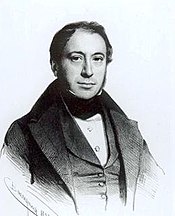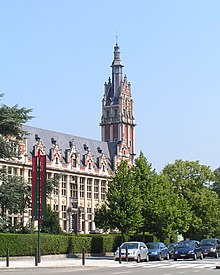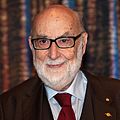Université libre de Bruxelles
 Seal of the ULB, created in 2013. | |
Latin: Universitas Bruxellensis | |
Former name | Université libre de Belgique |
|---|---|
| Motto | Scientia vincere tenebras |
Motto in English | Conquering darkness with knowledge |
| Type | Independent/Partly state funded |
| Established | 1834 1970 (split) |
| Affiliation | Freemasonry |
| President | Pierre Gurdjian |
| Rector | Yvon Englert |
Administrative staff | 4,400 |
| Students | 24,236 (2012)[1] |
| Location | Brussels , Belgium |
| Campus | Solbosch, Plaine, Erasme, Gosselies |
| Affiliations | EUA AUF ENTREE IMCC T.I.M.E. UNICA Atomium Culture |
| Website | http://www.ulb.ac.be/ |
 | |
The Université libre de Bruxelles (in English: Free University of Brussels), abbreviated ULB, is a French-speaking private research university in Brussels, Belgium.
The Free University of Brussels was originally established in 1834 by Belgian lawyer Pierre-Théodore Verhaegen and split into the French-speaking ULB and Dutch-speaking Vrije Universiteit Brussel (VUB) in 1970. it is one of the most important Belgian universities. A major research center open to Europe and the world,[2][3] it has about 24,200 students, 33% of whom come from abroad, and an equally cosmopolitan staff.[1] In 2018, ULB was globally ranked 175th by The Times Higher Education, 151th by Shanghai Ranking (AWRU).
Contents
1 Name
2 History
3 Campuses
4 Faculties, schools and institute
5 International Privileged Partnerships[6]
6 Rankings
7 Notable alumni and faculty
8 Nobel Prize Winners
9 See also
10 Notes
11 References
12 External links
Name
Brussels has two universities whose names mean Free University of Brussels in English: the French-speaking Université libre de Bruxelles and the Dutch-speaking Vrije Universiteit Brussel (VUB). Neither uses the English translation, since it is ambiguous.
History

Portrait of Théodore Verhaegen, founder of the ULB
When the Belgian State was formed in 1830 by nine breakaway provinces from the Kingdom of the Netherlands, it had three state universities, in Ghent, Liège and Leuven, but no university in the new capital, Brussels. Since the government was reluctant to fund another state university, a group of Freemasons and intellectuals led by Pierre-Théodore Verhaegen and Auguste Baron planned to create a private university, which was permitted under the Belgian Constitution. After the Catholic Church sponsored the foundation of the Catholic University of Mechlin in 1834, the Université libre de Belgique (Free University of Belgium) opened on 20 November 1834. In 1836, it changed its name to Université libre de Bruxelles.[4]
The school's football team won the bronze medal at the 1900 Summer Olympics.[citation needed]
As part of its commitment to academic freedom, the ULB closed down in 1941 rather than collaborate with the Nazi occupation of Belgium.[4]
Since 1935, some courses have been taught in both French and Dutch. Beginning in 1963, all faculties offered courses in both languages. In October 1969, shortly after the language dispute at the Catholic University of Leuven, the French and Dutch entities of the ULB separated into two distinct universities. With the act of 28 May 1970, the Vrije Universiteit Brussel and the Université libre de Bruxelles officially became two separate legal, administrative and scientific entities.[citation needed]
November 20, called Saint Verhagen (often shortened to St V) for Pierre-Théodore Verhaegen, is a holiday for students of both the Université libre de Bruxelles and the Vrije Universiteit Brussel.[citation needed]
Campuses

The main building on the Solbosch campus
The ULB comprises three main campuses: the Solbosch campus, on the territories of Brussels and Ixelles municipalities in the Brussels-Capital Region, the Plaine campus in Ixelles, and the Erasmus campus in Anderlecht, beside the Erasmus Hospital.
The main and largest campus of the university is the Solbosch, which hosts the administration and general services of the university. It also includes most of the faculties of the humanities, the École polytechnique, the large library of social sciences, and among the museums of the ULB, the Museum of Zoology and Anthropology, the Allende exhibition room and the M. De Ghelderode Museum.
The Plaine campus hosts the Faculty of Science and the Faculty of Pharmacy. There are also the Experimentariums of physics and chemistry, the Museum of Medicinal Plants and Pharmacy and student housing. This site is served by the metro station: Delta.
The Erasmus campus houses the Erasmus Hospital and the Pôle Santé, the Faculty of Medicine, the School of Public Health and the Faculty of Motor Sciences. There is also the School of Nursing (with the Haute école libre de Bruxelles - Ilya Prigogine), the Museum of Medicine and the Museum of Human Anatomy and Embryology. This site is served by the metro station: Erasmus.
The university also has buildings and activities in the Brussels municipality of Auderghem, and outside of Brussels, in Charleroi on the Aéropole Science Park and Nivelles.
Faculties, schools and institute

The Erasmus campus in Anderlecht
- Institute for European studies[5]
- Interfacultary School of Bio-Engineering
School of Public Health
- High Institute of Physical Education and Kinesiotherapy
- Institute of Work Sciences
- Institute of Statistics and Operational Research
- Institute for Astronomy and Astrophysics
International Privileged Partnerships[6]
University of California, Berkeley, University of Oxford, University of Cambridge, Université de Montréal, Waseda University, Université Pierre et Marie Curie - Paris VI, BeiHang University, Universidade de Sao Paulo, Université de Lausanne, Université de Genève, University Ouaga I Pr. Joseph Ki-Zerbo, University of Lubumbashi
| Faculty or Institute | Bachelor's degrees | Master's degrees | Complementary master's degrees |
|---|---|---|---|
Faculty of Architecture | Architecture | Architecture | |
Faculty of Philosophy and Letters | Ancient Languages and Literature: 1. Classic orientation; 2. Oriental orientation | Ancient Languages and Literature: 1. Classic orientation (1 or 2 years) 2. Oriental orientation (1 or 2 years) | African Languages and Cultures |
| Pedagogy in Higher Education | |||
| Language Sciences | |||
| Art History and Archaeology | Art History and Archaeology (1 or 2 years) | ||
| Art History and Archaeology: Musicology | Art History and Archaeology: Musicology (1 or 2 years) | ||
| French and Roman Languages and Literature | Cultural Management | ||
| History | Ethics | ||
| Information and Communication | French and Roman Languages and Literature (1 or 2 years) | ||
| Modern Languages and Literature | French and Roman Languages and Literature: French Foreign Language | ||
| Modern Languages and Literature: 1. General orientation 2. Germanic orientation 3. Oriental orientation 4. Slavic orientation | History (1 or 2 years) | ||
| Philosophy | Information and Communication (1 or 2 years) | ||
| Religious and Secular Studies | Information and Communication Sciences and Technologies | ||
| Linguistics | |||
| Modern Languages and Literature (1 or 2 years) | |||
| Modern Languages and Literature: 1. Arab orientation 2. Germanic orientation (1 or 2 years) 3. Oriental orientation (1 or 2 years) 4. Slavic orientation (1 or 2 years) | |||
| Multilingual Communication | |||
| Performing Arts | |||
| Philosophy (1 or 2 years) | |||
| Religious and Secular Studies | |||
Faculty of Law and Criminological Science | Law | Criminology | Economic Law |
| Law | International Law | ||
| Notaries | |||
| Public and Administrative Law | |||
| Social Law | |||
| Tax Law | |||
Faculty of Psychological Science, and of Education | Psychology and Educational Sciences | Educational Sciences | Pedagogy in Higher Education |
| Psychology and Educational Sciences: Speech Therapy | Psychology | Psychoanalytic Theories | |
| Speech Therapy | Risk Management and Well-being at Work | ||
Faculty of Sciences (recently absorbed the Institute of Environment Gestion (IGEAT)) | Biology | Actuarial Science | Nanotechnology |
| Chemistry | Biochemistry and Molecular and Cellular Biology | ||
| Computer Sciences | Bioengineering: Agricultural Sciences | ||
| Engineering: Bioengineering | Bioengineering: Chemistry and Bio-industries | ||
| Geography | Bioengineering: Environmental Sciences and Technologies | ||
| Geology | Bioinformatics and Modeling | ||
| Mathematics | Biology (1 year) | ||
| Physics | Chemistry (1 or 2 years) | ||
| Sciences (Polyvalent first year) | Computer Sciences (1 or 2 years) | ||
| Environmental Sciences and Management (1 or 2 years) | |||
| Geography (1 or 2 years) | |||
| Geology (1 or 2 years) | |||
| Mathematics (1 or 2 years) | |||
| Organismal Biology and Ecology | |||
| Physics (1 or 2 years) | |||
| Statistics | |||
| Tourism Sciences and Management (1 or 2 years) | |||
Faculty of Applied Sciences/Polytechnic School | Engineering: Bioengineering | Bioengineering: Agricultural Sciences | Conservation and Restoration of Immovable Cultural Heritage |
| Engineering: Civil | Bioengineering: Chemistry and Bio-industries | Nanotechnology | |
| Engineering: Civil Architect | Bioengineering: Environmental Sciences and Technologies | Nuclear Engineering | |
| Civil Engineering: Architectural | Transportation Management | ||
| Civil Engineering: Biomedical | Urban and Regional Planning | ||
| Civil Engineering: Chemistry and Material Science | |||
| Civil Engineering: Computer | |||
| Civil Engineering: Constructions | |||
| Civil Engineering: Electrical | |||
| Civil Engineering: Electro-mechanical | |||
| Civil Engineering: Mechanical | |||
| Civil Engineering: Physicist | |||
Faculty of Medicine | Biomedical Sciences | Biomedical Sciences | |
| Dentistry | Dentistry | ||
| Medicine | Medicine | ||
| Veterinary Medicine | |||
Institute of Pharmacy | Pharmaceutical Sciences | Biomedical Sciences | Clinical Biology (for pharmacists) |
| Pharmaceutical Sciences | Hospital Pharmacy | ||
| Industrial Pharmacy | |||
Faculty of Social and Political Sciences | Human and Social Science | Anthropology | |
| Political Science | Human Resources Management | ||
| Sociology and Anthropology | Political Science (1 or 2 years) | ||
| Political Science: International Relations | |||
| Population and Development | |||
| Public Administration | |||
| Sociology | |||
| Sociology and Anthropology (1 year) | |||
| Work Science (1 or 2 years) | |||
Solvay Brussels School of Economics and Management | Business Engineering | Business Engineering | Industrial Management and Technology |
| Economics | Economics (1 or 2 years) | Microfinance | |
Institute of European Studies | European Studies | European Law | |
| Interdisciplinary Analysis of European Construction |
Rankings
University rankings | |
|---|---|
| Global | |
ARWU World[7] | 151-200 |
THE World[9] | 201-250 |
QS World[8] | 239 |
Notable alumni and faculty

Francois Englert, Nobel Prize in Physics (2013)

Charles Michel, Prime Minister of Belgium

Amélie Nothomb, Belgian Francophone novelist
Vũ Đức Đam (b. 1963), politician, current Deputy Prime Minister of Vietnam.
Amer Husni Lutfi (b. 1956), economics, politician, Syrian minister of economy and trade.
Jules Anspach (1829–1879), law, politician, Mayor of Brussels.
Amir Abbas Hoveida, Iranian Prime Minister
Count Richard Goblet d'Alviella, Belgian businessman
Philippe Autier, epidemiologist and clinical oncologist
Zénon-M. Bacq, radiobiologist, laureate of the 1948 Francqui Prize
Radu Bălescu, Romanian and Belgian physicist, laureate of the 1970 Francqui Prize
Didier Bellens, economics, CEO of Belgacom
Bahadir Kaleagasi, European law & economics, International co-ordinator of TUSIAD
Jules Bordet, physician, laureate of the 1919 Nobel Prize in Physiology or Medicine
Karel Bossart, aeronautical engineer, designer of the SM-65 Atlas
Jean Brachet (1909–1998), medicine, biochemist
Robert Brout, Belgian physicist, laureate of the 2004 Wolf Prize
Jean Bourgain, Belgian mathematician, laureate of the 1994 Fields Medal
Heidi Cruz, wife of US presidential candidate Ted Cruz
Herman De Croo, law, politician
Pierre Deligne, Belgian mathematician, laureate of the 1978 Fields Medal
Henri De Page (1894–1969), law, professor in law, generally seen as the most important Belgian lawyer ever.
Antoine Depage, Belgian surgeon
Lodewijk De Raet, Belgian economist and politician
Mathias Dewatripont, Belgian economist, laureate of the 1998 Francqui Prize
François Englert, Belgian physicist, laureate of the 2004 Wolf Prize, laureate of the 2013 Nobel Prize in Physics
Jacques Errera, Belgian physicochemist, laureate of the 1938 Francqui Prize
Louis Franck, Belgian lawyer, liberal politician and statesman
Matyla Ghyka, Romanian poet, novelist, mathematician, historian, and diplomat
Michel Goldman, Belgian immunologist
Nico Gunzburg (1882–1984), lawyer and criminologist.
Camille Gutt (1884–1971), law, first Managing Director of the International Monetary Fund
Marc Henneaux, Belgian physicist, laureate of the 2000 Francqui Prize
Enver Hoxha, Albanian politician, leader of Communist Albania
Jeton Kelmendi, Albanian writer, laureate of the 2010 International Solenzara Prize
Julius Hoste Jr., Belgian businessman and leading Flemish liberal politician
Paul Janson (1840–1913), liberal politician.
Daniel Janssen, engineer, businessman
Henri La Fontaine, Belgian lawyer, laureate of the 1913 Nobel Prize for Peace
Jacques-François Lai, Belgian Nuclear Physicist
Adrien-Jean Le Mayeur, Belgian painter residing in Bali, Indonesia
Maurice Lippens, Belgian businessman
Lucien Lison, Belgian and Brazilian physician and biochemist, the father of histochemistry.
Paul Magnette, Belgian political scientist, laureate of the 2000 Exceptional Francqui Prize for European Research
Adolphe Max (1869–1939), law, politician, Mayor of Brussels from 1909 until his death.
Françoise Meunier, medicine, Director General of the EORTC.
Constantin Mille, Romanian socialist militant and journalist
Axel Miller, Belgian businessman, CEO of Dexia
Roland Mortier, Belgian philologist, laureate of the 1965 Francqui Prize
François Narmon, economist, businessman
Amélie Nothomb (b. 1967), Belgian writer, laureate of the 1999 Grand Prix du roman de l'Académie française
Paul Otlet (1868–1944), law, founding father of documentation
Marc Parmentier, medicine, laureate of the 1999 Francqui Prize
Etienne Pays (b. 1948), molecular biologist, laureate of the 1996 Francqui Prize and Carlos J. Finlay Prize for Microbiology
Robert Peston, ITV News Political Editor
Martine Piccart, medicine, President of the EORTC.
Marie Popelin (1846–1913), law, feminist
Ilya Prigogine, Belgian physicist and chemist, laureate of the 1955 Francqui Prize, and laureate of the 1977 Nobel Prize in Chemistry
Eric Remacle, Belgian economist, laureate of the 2000 Exceptional Francqui Prize for European Research
David Ruelle, Belgian and French mathematical physicist
Jean Auguste Ulric Scheler, Belgian philologist
Paul-Henri Spaak, Belgian politician and one of the Founding fathers of the European Union
Isabelle Stengers, chemistry, philosophy
Jean Stengers (1922–2002), historian
Jacques Tits, Belgian mathematician, laureate of the 1993 Wolf Prize and of the 2008 Abel Prize
Michel Vanden Abeele, economics, diplomat
Raoul Vaneigem, Situationist theorist
Léon Van Hove (1924–1990), physics, laureate of the 1958 Francqui Prize, Director General of the CERN (1976–1980)
Jan Van Rijswijck (1853–1906), law, mayor of Antwerp
Emile Vandervelde (1866–1938) Belgian statesman and socialist leader, lawyer and sociologist
August Vermeylen, Belgian writer and literature critic
Raoul Warocqué, Belgian industrialist
Charles Woeste (1837–1922), lawyer and politician
Adamantios Vassilakis (b. 1942), former Greek ambassador to the United Nations
Fradique de Menezes (b. 1942), President of São Tomé and Príncipe since 2001
Roberto Lavagna (b. 1942), former Argentine minister of economy ( 2002–2005)
Nobel Prize Winners
Henri La Fontaine (1854–1943): Nobel Prize for Peace in 1913.
Jules Bordet (1870–1961): Nobel Prize in Physiology or Medicine in 1919.
Albert Claude (1898–1983): Nobel Prize in Physiology or Medicine in 1974.
Ilya Prigogine (1917–2003): Nobel Prize in Chemistry in 1977.
François Englert (born 1932): Nobel Prize in Physics in 2013.
Denis Mukwege (born 1955): Nobel Prize for Peace in 2018.

Henri La Fontaine, Nobel Prize for Peace (1913)

Jules Bordet, Nobel Prize in Physiology or Medicine (1919)

Albert Claude, Nobel Prize in Physiology or Medicine (1974)

Francois Englert, Nobel Prize in Physics (2013)
See also
- Aéropole Science Park
- Atomium Culture
- BioVallée
- Institut Jules Bordet
- Science and technology in Brussels
- Solvay Business School
- Top Industrial Managers for Europe
- University Foundation
- Vrije Universiteit Brussel
- Royal Statistical Society of Belgium
Notes
^ ab "Archived copy" (PDF). Archived from the original (PDF) on 2013-06-09. Retrieved 2013-09-04.CS1 maint: Archived copy as title (link) .mw-parser-output cite.citation{font-style:inherit}.mw-parser-output q{quotes:"""""""'""'"}.mw-parser-output code.cs1-code{color:inherit;background:inherit;border:inherit;padding:inherit}.mw-parser-output .cs1-lock-free a{background:url("//upload.wikimedia.org/wikipedia/commons/thumb/6/65/Lock-green.svg/9px-Lock-green.svg.png")no-repeat;background-position:right .1em center}.mw-parser-output .cs1-lock-limited a,.mw-parser-output .cs1-lock-registration a{background:url("//upload.wikimedia.org/wikipedia/commons/thumb/d/d6/Lock-gray-alt-2.svg/9px-Lock-gray-alt-2.svg.png")no-repeat;background-position:right .1em center}.mw-parser-output .cs1-lock-subscription a{background:url("//upload.wikimedia.org/wikipedia/commons/thumb/a/aa/Lock-red-alt-2.svg/9px-Lock-red-alt-2.svg.png")no-repeat;background-position:right .1em center}.mw-parser-output .cs1-subscription,.mw-parser-output .cs1-registration{color:#555}.mw-parser-output .cs1-subscription span,.mw-parser-output .cs1-registration span{border-bottom:1px dotted;cursor:help}.mw-parser-output .cs1-hidden-error{display:none;font-size:100%}.mw-parser-output .cs1-visible-error{font-size:100%}.mw-parser-output .cs1-subscription,.mw-parser-output .cs1-registration,.mw-parser-output .cs1-format{font-size:95%}.mw-parser-output .cs1-kern-left,.mw-parser-output .cs1-kern-wl-left{padding-left:0.2em}.mw-parser-output .cs1-kern-right,.mw-parser-output .cs1-kern-wl-right{padding-right:0.2em}
^ "Université libre de Bruxelles". QS Top Universities. Retrieved March 17, 2017.
^ "ARWU World University Rankings 2016 | Academic Ranking of World Universities 2016 | Top 500 universities | Shanghai Ranking - 2016". www.shanghairanking.com. Retrieved 2017-07-07.
^ ab "A University born of an idea". Université libre de Bruxelles. Retrieved 2016-08-04.
^ "Home". www.iee-ulb.eu. Retrieved 2018-06-25.
^ "Les relations internationales de l'ULB". www.ulb.ac.be. Retrieved 2018-06-25.
^ "Academic Ranking of World Universities 2018". Shanghai Ranking Consultancy. Retrieved December 2, 2018.
^ "QS World University Rankings 2019". Quacquarelli Symonds Limited. Retrieved December 2, 2018.
^ "World University Rankings 2019". Times Higher Education. Retrieved December 2, 2018.
References
- Despy, A., 150 Ans De L‘Ulb Universite Libre De Bruxelles, Brussels, 1984
- Noel, F., 1894 Universite Libre De Bruxelles En Crise, Brussels, 1994
- The ULB, a university born of an idea
- ULB, at a glance
External links
| Wikimedia Commons has media related to Université libre de Bruxelles. |
- Official home page
Coordinates: 50°48′42″N 4°22′52″E / 50.81167°N 4.38111°E / 50.81167; 4.38111



